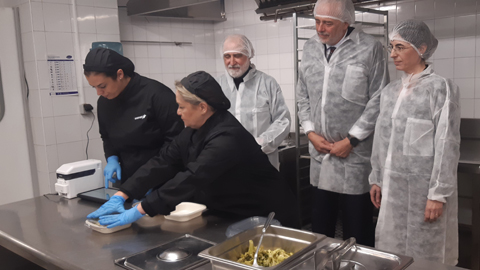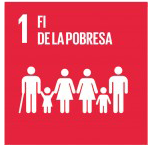The UAB, first university to join the food sustainability project Recooperem
The UAB joins the "Recooperem, cuina per compartir", a meal-sharing project coordinated and promoted by the Vallès Occidental Regional Council. The adherence was presented in an event that took place on Tuesday 14 January in the Faculty of Medicine's restaurant. At the UAB, a pilot test of the project has begun in the restaurants of the Faculty of Medicine and the Plaça Cívica, and from now on will be implemented in other restaurants on campus, with which it is planned to redistribute 2,520 leftover meals a year to social organisations and avoid 882 kg of organic waste.

The UAB thus becomes the first university to adhere to this food sustainability project, in which a total of 59 schools, 5 companies, one hospital and 18 social entities already participate.
On Tuesday 14 January the UAB presented its adhesion to the project Recooperem, cuina per compartir (Recooperem, cooking for sharing). The event took place at the Bellaterra campus, in the restaurant of the Faculty of Medicine, with the participation of the rector of the UAB, Javier Lafuente, and the president of the Vallès Occidental Regional Council, Xavier Garcés. Also present were the national director of Quality of the catering company Aramark, Rosa Gel; the manager of the Vallès Occidental Regional Council, Núria Carrés, and the dean of the Faculty of Medicine of the UAB, Salvador Navarro.
Later, a visit was made to the kitchen of the Faculty of Medicine's restaurant, from where leftover meals are collected, packaged, labeled, frozen and distributed to social entities so that they can be of benefit to people in need.
The UAB, first university to participate in this project
On average, 35 kg of food is wasted per inhabitant per year in Catalonia. According to the Food and Agriculture Organisation of the United Nations (FAO), one third of the food produced is thrown away. In addition, food waste is responsible for between 8 and 10% of global greenhouse gas emissions. Catalonia's Food Waste and Loss Prevention Act (2020) proposes a 50% reduction in food waste by 2030.
This food sustainability project aims to prevent food losses and waste, waste prevention, social cohesion and equality in the Vallès Occidental region.
For the past two months, a pilot test has been carried out in two restaurants on campus: the one in the Plaça Cívica and the one in the Faculty of Medicine, both managed by the catering company Aramark. Once the project is implemented in the seven restaurants on the Bellaterra campus (managed, in addition to Aramark, by two other catering companies: Grupo Soteras and Serunion), the UAB expects to collect and redistribute to social entities a total of 2,520 meals per year and thus avoid 882 kg of organic waste per year.
Right now, the Recooperem project includes the participation of 59 schools, five companies and one hospital. Eighteen social entities are also involved. Since 2015, 129,851 meals have been redistributed and almost 4,000 benefited families have been reached, which has avoided generating more than 49,259 kg of waste.
How the Recooperem project works
The project is managed with a computer platform that allows the collection of food traceability data from the production centre to distribution and final consumption. It incorporates new technologies to the supply centres and participating entities, and a digital circuit is created to collect information and carry out a control, follow-up and evaluation of the process.
Once the daily lunch service is finished, the available food suitable for consumption is prepared as complete meals in lunch boxes provided by the local councils. The cooked food that has not been served and that has been kept in adequate hygienic and sanitary conditions is distributed in containers, and these are labeled with relevant information (food, quantity and freezing date) and frozen at -18 °C. They have a maximum shelf life of two months if kept frozen.
The meals are then collected and distributed to families that meet certain requirements, such as elderly people who are dependent or live alone, or families withfuel poverty or dependent children. These meals are a guarantee that the entities can have access to safe and quality cooked food, which complements the supply of basic foods that are usually collected through food drives, thus improving the nutritional contribution and avoiding food wastage.
Pioneering the fight to prevent food waste
UAB has been a pioneer in the fight against food waste and has led studies and publications in this area, both at the University itself and at regional level with other administrations. It is committed to contributing to the prevention of food waste as part of its climate policy, which aims to achieve climate neutrality by 2030. The Institute of Environmental Science and Technology (ICTA-UAB) participates in the project "Education and awareness-raising in schools on food waste", promoted by the HUB B30, together with the Vallès Occidental Regional Council and the Vallès Oriental Regional Council.
The QS World University Rankings: Sustainability 2025 ranks the UAB first in Spain in sustainability and social impact. Out of 1,743 institutions analysed, it ranks 61st in the world and 32nd in Europe. This ranking measures the social and environmental impact of universities through three aspects: environmental impact, social impact and governance.
Click on this documentary to learn more about the Recooperem project.
The UAB, with Sustainable Development Goals
Good health and well-being
Reduced inequalities
 No poverty
No povertyZero hunger
Responsible consumption and production
Sustainable cities and communities
Partnerships for the goals
Climate action